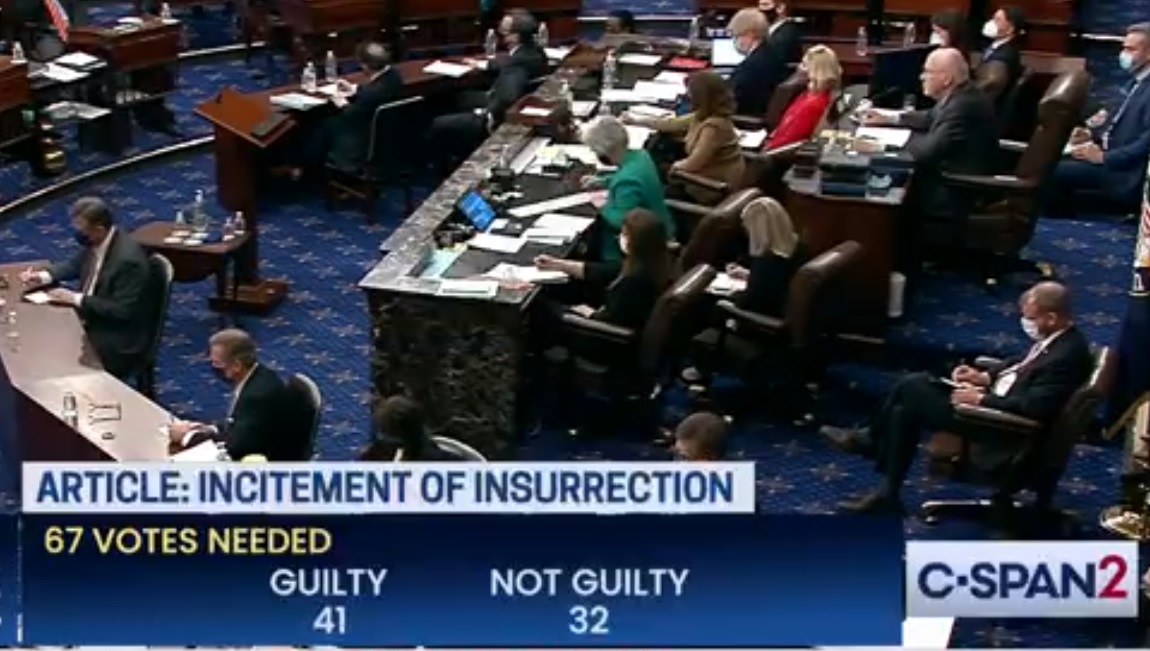Senate Acquits Donald Trump of Inciting Capitol Insurrection
Trump attorney partially blames media for climate of "rioting and pillaging"

The smarter way to stay on top of the multichannel video marketplace. Sign up below.
You are now subscribed
Your newsletter sign-up was successful
The Senate voted Saturday (Feb. 13) 57 to 44 to acquit former President Donald Trump of a single impeachment article alleging the high crime and misdemeanor of inciting the Jan. 6 Capitol insurrection, but not before Trump's lead lawyer took a parting shot at the media.
Seven Republicans joined 48 Democrats and two independents who caucus with the Dems, to vote for conviction.
The Senators were required to stand and deliver their vote of guilt or not guilty. Conviction required a two-thirds vote.
That vote also constituted a "no" on the accompanying ban on Trump holding future federal office.
The vote came after a pause of a couple of hours to consider whether witnesses should be called following the news that a Republican congresswoman had been told by House Minority Leader Kevin McCarthy that the President had said during the insurrection that the mob appeared to be more interested in the outcome than McCarthy.
Also Read: Impeachment Trial Goes On
Ultimately, her statement to that effect was entered into the record and the closing arguments and vote proceeded.
The smarter way to stay on top of the multichannel video marketplace. Sign up below.
In his closing, Trump lawyer Michael van der Veen took aim at the media, much as his client has done for the past four years, saying the impeachment managers' evidence had been "cribbed from a biased news media" and its second- and third-hand reporting.
Ven der Veen said the Capitol insurrectionists had gotten the idea that violence, rioting and radicalism were acceptable not from President Trump or Republicans, but months of rioting and violence over summer that was supported by Democrats arguing that angry, marginalized people could be expected to "blow off steam."
He said arriving at a place where "rioting and pillaging" had become commmonplace came due to "month after month of political leaders and media personalities bloodthirsty for ratings glorifying civil unrest and damning the reasonable law enforcement measures that are required to quell violent mobs."
The vote also came after a relatively brief, but video-heavy, defense by Trump attorneys Friday (Feb. 12) (using, at about three hours, only a fraction of their allotted 16 hours), likely being able to count the votes of Republicans who have signaled from the outset they did not plan to convict.
It wrapped up a compelling, five-day, made-for-television and streaming event.
Also Read: Impeachment Managers Point to Trump Tweets, Videos
The former President was twice impeached as a sitting President by the Democratically controlled House, and twice acquitted by the Republican-controlled Senate, perhaps appropriate since impeachment, including the Senate trial, is a political process.
Trump's lawyers argued he had not incited the violence at the Capitol and that the proceeding was unconstitutional in any event. They said Democrats were simply trying to keep a political opponent they hated from being re-elected President.
The impeachment managers said it was clear the President had fanned the flames and lit the match and knew what he was doing by calling on a mob to overturn an election and that he could foresee the violence that ultimately ensued, violence he did little to stop.
Also Read: Trump Employs First Amendment Impeachment Defense
Both sides relied heavily on videos to make their points, including from the mainstream media Trump has long argued are fake and enemies of the people.
Trump lawyers also argued that the other side had doctored, by selectively editing and abridging, their video evidence in order to create a false narrative.
"While the final vote did not lead to a conviction, the substance of the charge is not in dispute," said President Joe Biden. "Even those opposed to the conviction, like Senate Minority Leader McConnell, believe Donald Trump was guilty of a 'disgraceful dereliction of duty' and 'practically and morally responsible for provoking' the violence unleashed on the Capitol."
Contributing editor John Eggerton has been an editor and/or writer on media regulation, legislation and policy for over four decades, including covering the FCC, FTC, Congress, the major media trade associations, and the federal courts. In addition to Multichannel News and Broadcasting + Cable, his work has appeared in Radio World, TV Technology, TV Fax, This Week in Consumer Electronics, Variety and the Encyclopedia Britannica.

